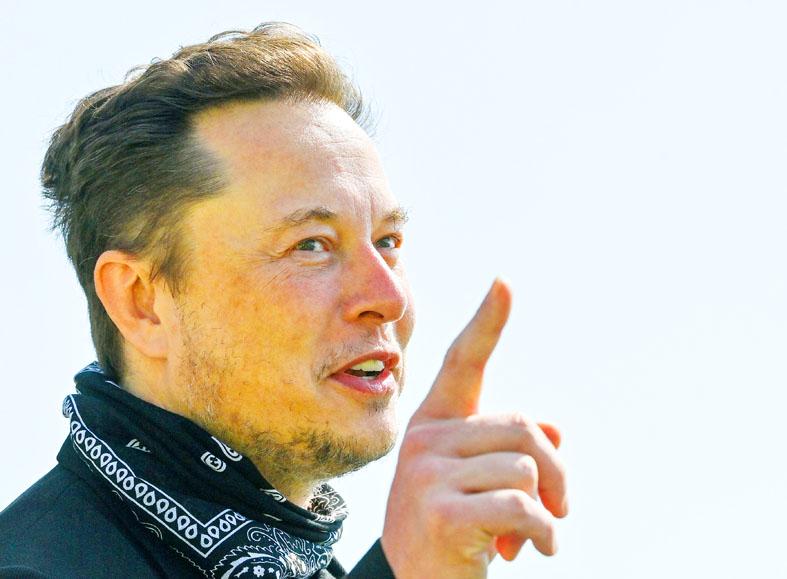Tesla Inc CEO Musk on Thursday said the electric automaker would probably launch a “Tesla Bot” humanoid robot prototype next year, designed for dangerous, repetitive or boring work that people do not like to do.
Speaking at Tesla’s AI Day event, the billionaire entrepreneur said the robot, at about 173cm tall, would be able to handle jobs from attaching bolts to cars with a wrench, to picking up groceries at stores.
The robot would have “profound implications for the economy,” Musk said, addressing a labor shortage.

Photo: Reuters
He said it was important to make the machine not “super-expensive.”
The AI Day event came amid growing scrutiny over the safety and capability of the company’s “Full Self-Driving” advanced driver assistant system.
Musk did not comment on that scrutiny over the safety of Tesla technology, but said that he was confident of achieving full self-driving with higher safety than humans using current in-car cameras and computers.
US safety regulators earlier this week opened an investigation into Tesla’s driver assistant system because of accidents where Tesla cars crashed into stationary police cars and fire trucks.
Two US senators have also called on the Federal Trade Commission to investigate Tesla’s claims for its “Full Self-Driving” system.
At the event on Thursday Tesla also unveiled its in-house designed chips, Dojo, to help develop its automated driving system.
Musk said Dojo would be operational next year.
He said Tesla would also introduce new hardware for its self-driving computer for its Cybertruck electric pick-up truck in “about a year or so.”
Tesla last month pushed back the launch of its much-anticipated Cybertruck from this year, without giving a timeframe for its arrival on the market.
Some questioned whether Musk, who has frequently touted technology advances at showpiece events only to scale plans down later on, would be able to come good on his aims for the robot.
“Is the ‘Tesla Bot’ the next dream shot to pump up the hype machine?” said Raj Rajkumar, professor of electrical and computer engineering at Carnegie Mellon University.
“I can safely say that it will be much longer than 10 years before a humanoid bot from any company on the planet can go to the store and get groceries for you,” he said.

UNCERTAINTY: Innolux activated a stringent supply chain management mechanism, as it did during the COVID-19 pandemic, to ensure optimal inventory levels for customers Flat-panel display makers AUO Corp (友達) and Innolux Corp (群創) yesterday said that about 12 to 20 percent of their display business is at risk of potential US tariffs and that they would relocate production or shipment destinations to mitigate the levies’ effects. US tariffs would have a direct impact of US$200 million on AUO’s revenue, company chairman Paul Peng (彭雙浪) told reporters on the sidelines of the Touch Taiwan trade show in Taipei yesterday. That would make up about 12 percent of the company’s overall revenue. To cope with the tariff uncertainty, AUO plans to allocate its production to manufacturing facilities in

Taiwan will prioritize the development of silicon photonics by taking advantage of its strength in the semiconductor industry to build another shield to protect the local economy, National Development Council (NDC) Minister Paul Liu (劉鏡清) said yesterday. Speaking at a meeting of the legislature’s Economics Committee, Liu said Taiwan already has the artificial intelligence (AI) industry as a shield, after the semiconductor industry, to safeguard the country, and is looking at new unique fields to build more economic shields. While Taiwan will further strengthen its existing shields, over the longer term, the country is determined to focus on such potential segments as

TAKING STOCK: A Taiwanese cookware firm in Vietnam urged customers to assess inventory or place orders early so shipments can reach the US while tariffs are paused Taiwanese businesses in Vietnam are exploring alternatives after the White House imposed a 46 percent import duty on Vietnamese goods, following US President Donald Trump’s announcement of “reciprocal” tariffs on the US’ trading partners. Lo Shih-liang (羅世良), chairman of Brico Industry Co (裕茂工業), a Taiwanese company that manufactures cast iron cookware and stove components in Vietnam, said that more than 40 percent of his business was tied to the US market, describing the constant US policy shifts as an emotional roller coaster. “I work during the day and stay up all night watching the news. I’ve been following US news until 3am

COLLABORATION: Given Taiwan’s key position in global supply chains, the US firm is discussing strategies with local partners and clients to deal with global uncertainties Advanced Micro Devices Inc (AMD) yesterday said it is meeting with local ecosystem partners, including Taiwan Semiconductor Manufacturing Co (TSMC, 台積電), to discuss strategies, including long-term manufacturing, to navigate uncertainties such as US tariffs, as Taiwan occupies an important position in global supply chains. AMD chief executive officer Lisa Su (蘇姿丰) told reporters that Taiwan is an important part of the chip designer’s ecosystem and she is discussing with partners and customers in Taiwan to forge strong collaborations on different areas during this critical period. AMD has just become the first artificial-intelligence (AI) server chip customer of TSMC to utilize its advanced